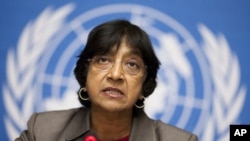A team of top-level specialists from the U.N. Human Rights Office starts a week-long assessment of the human-rights situation and priorities in Tunisia.
The eight-member team of human-rights specialists has an intense schedule ahead. Over the coming week, the experts will meet with the interim authorities, civil society groups, U.N. agencies and other key people.
U.N. Human Rights Spokesman, Rupert Colville, says their aim is to explore ways of advancing human rights in Tunisia. He says they will seek to gain a first-hand understanding of the human rights challenges that confront Tunisian society.
“Nothing beats being on the ground and talking face-to-face with people, talking to people you normally do not have contact with, hearing all different views, and seeing really first-hand what happened, what the ramifications are and what the general mood is,” Colville said. “And, also probably learning a lot about endemic problems, which lead to human-rights abuses and could lead to future human-rights abuses.”
Colville says the mission will explore ways to mend the system so that a future Tunisia is a leading light in the region, a beacon for honoring the human rights of all people.
He says U.N. High Commissioner, Navi Pillay believes human rights abuses were at the heart of the problems that led to the ousting of Tunisia’s dictatorial leader. Therefore, human rights must be at the forefront of the solutions to those problems.
He says the human-rights experts will return to Geneva when they have completed their assessment and write up their observations and recommendations. He says the High Commissioner wants to be able to use these findings to put together a set of concrete proposals to improve the human-rights situation in Tunisia.
He says some of the proposals may be of an immediate nature. Others, he says, will be more complicated and will take longer to implement.
“For example, revising laws, which is never a quick business and revising institutions. The police, the secret police, the judiciary-making sure the judiciary functions independently, which it was not really doing before. These are very major systemic problems that will need probably short, medium and long-term action to sort out,” he stated.
Colville says the team is conducting its mission with an open mind. He says it wants to explore the possibilities for advancing human-rights in Tunisia and fully understand the challenges ahead.
He says High Commissioner Pillay will continue to closely watch the situation in Tunisia. He says she is intent on ensuring the human-rights aspirations of the Tunisian people are finally achieved, so their sacrifices will not be in vain.




